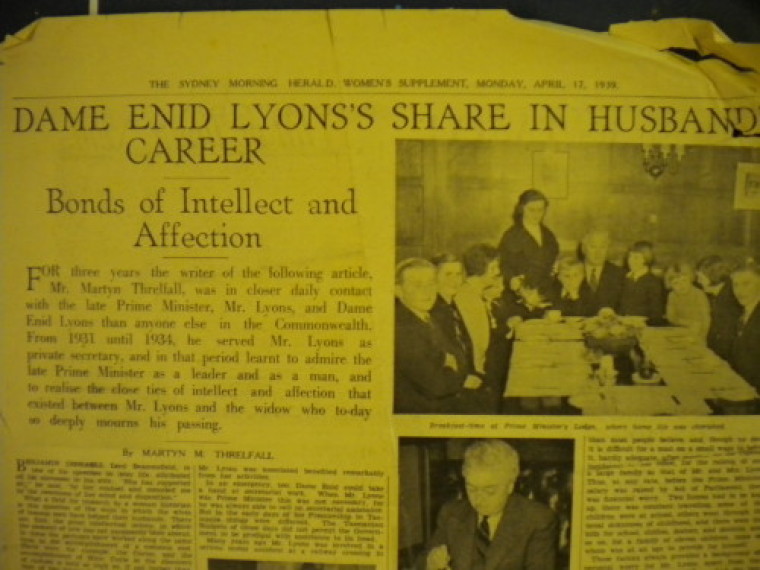
The writer was Martin Threlfall who was the Private Secretary to Prime Minister Joseph Lyons for part of his term in office, and he was paying tribute to Mrs Lyons after the death of her husband, just ten days earlier.
At that time, no-one could have predicted what heights Dame Enid would aspire to, in her own right and by her own intelligence and hard work.
But even then, it was known that Enid Lyons was no pushover in any endeavour or in any one's imagination. Enid was born 9 July 1897 and lived to 2 September 1981. She married Joseph married in 1915, and they had twelve children, one of whom died in infancy.
Joseph Lyons, had been the Premier of Tasmania between 1923 and 1928 and the Prime Minister of Australia between 1932 and 1939 – just a little short of the (then) record term for a Prime Minister in office.
In 1932 when Joseph became Prime Minister, Enid and the children moved into The Lodge in Canberra where she became an extremely popular political spouse. When Joseph died in 1939, aged 59, (the first Australian Prime Minister to die in office), Dame Enid returned to Tasmania.
Enid Lyons was made a Dame Grand Cross of the Order of the British Empire (GBE) in the Coronation Honours of 1936. Enid was, as they say, one in a million. In the 1943 federal election Dame Enid Lyons won the Division of Darwin in north-western Tasmania for the United Australia Party (one might say, the conservative side of Australian politics fore-runner of the Liberal Party).
Of course, since there is no provision in Australia for any heredity or 'legacy' appointments to Parliament, Enid's seat was won because of her own hard work, efficiency and personality. She had won over the 'hearts and minds' of her constituents and her appointment was 'fair and square' of her own volition.
Her speeches in Parliament generally espoused traditional views on the family and other social issues. Robert Menzies who became Prime Minister upon Joseph's death appointed Enid Lyons as Vice President of the Executive Council which afforded her a seat in Cabinet but her health declined under the strain of widowhood, the travel between Canberra and Tasmania, her duties and family. Dame Enid retired at the 1951 election.
Having left parliament, her health recovered, and she became a newspaper columnist between 1951 and 1954, a commissioner of the ABC from 1951 until 1962, as well as continuing to conduct a busy public life, with an emphasis on promoting family and women's issues.
Her two volumes of memoirs included allegations that Robert Menzies had been disloyal to Joseph Lyons in 1939 by going onto the back bench, which stress she believed led to his early grave when only 59.
Enid Lyons died in 1981 but not before being honoured again the year before on Australia Day with the Dame of the Order of Australia, only the second Australian women to have received such an honour.
Today, we refer to someone who can handle so many tasks competently either a
'super-mum' or say they are 'multi-tasking'. Many women have found they need to achieve great heights to be acknowledged by their community. Some feel that they have to be 'better' at a task than a man in an equivalent position to be noticed, and the saying is that they are like the actress and dancer Ginger Rogers who did everything that Fred Astair did, but backwards and in high heels.
I often feel that it would be a positive move in our society if more women, who work hard behind the scenes, could be awarded similar public accolades that Dame Enid was able to gain during her long and diligent life.
Our Australian Honours today are a good start – it is possible to nominate those in your own community whom you feel are doing something worthwhile, but are not being given their full due of recognition.
If you know of such a deserving person, may I suggest to you that you get your community together and nominate her (or him) for such an Australian award. All the information you need is at www.itsanhonour.gov.au/honours/nominating/nominating.cfm
Dame Enid, and my own late mother, would be proud of any such deserved community awards, for people who would not otherwise have been recognised. In my view many evangelical Christian women fail to be recognised as such simply because they are passionate for Jesus which in the minds of many, somehow precludes such legitimate community recognition.